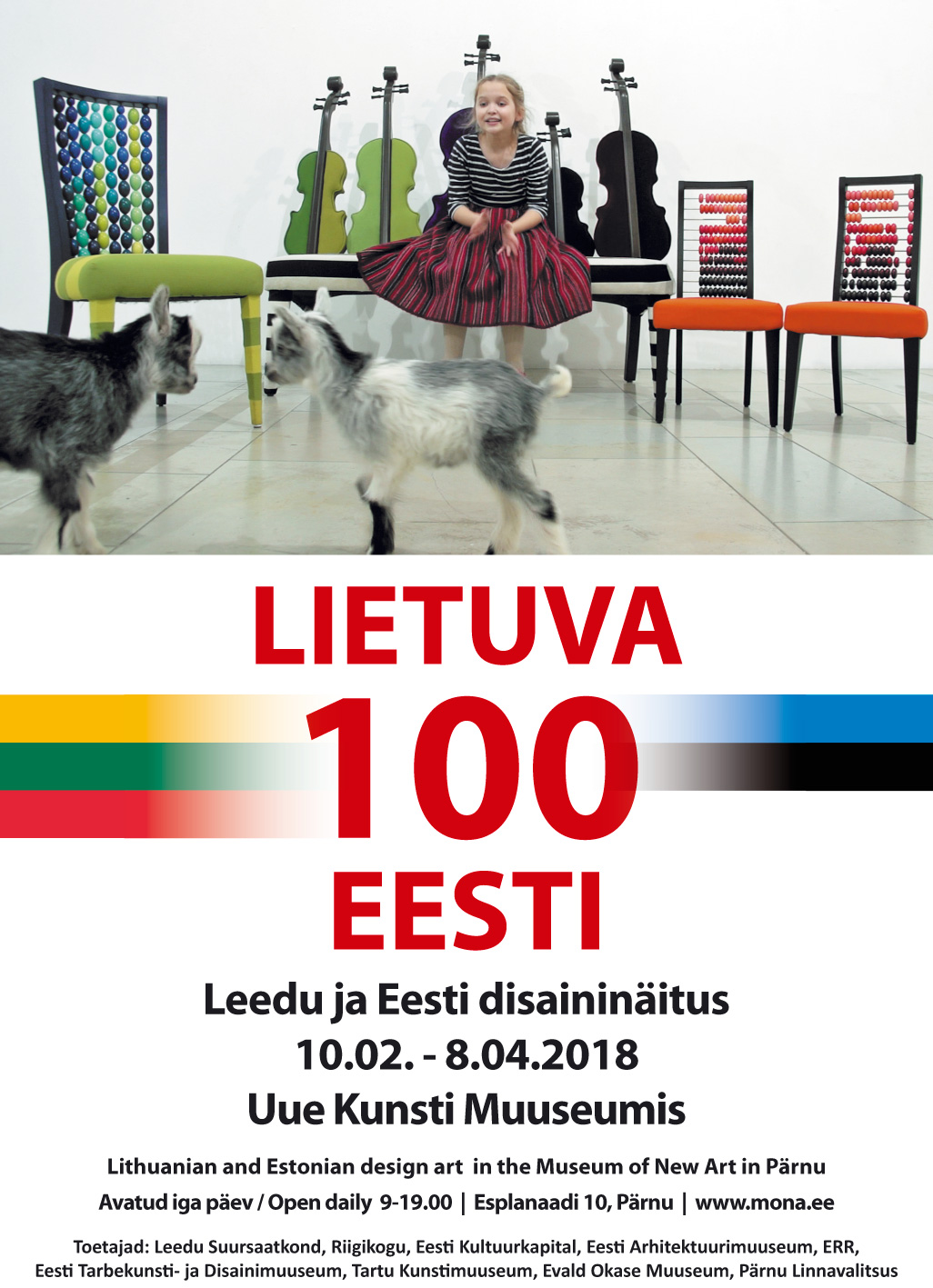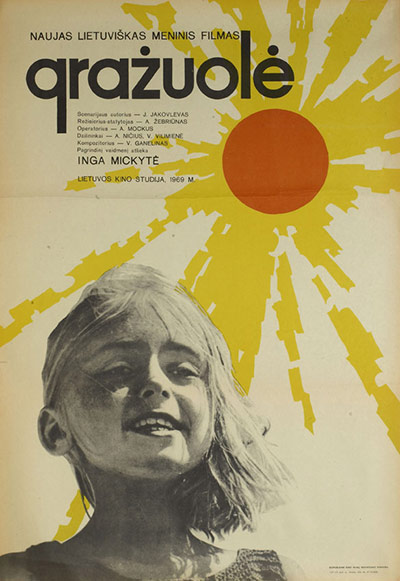| |
|
 |
LITHUANIA
100 ESTONIA
February
10 - April 8, 2018
Lithuanian
and Estonian design art
The birthdays
of the Republics of Lithuania and Estonia
are as of twins – both celebrate their
centennials in February. Lithuanian
Republic, though, was proclaimed 8 days
earlier, February 16th 2018. The Museum of
New Art in Pärnu will celebrate this great
event with a design exhibition LIETUVA 100
EESTI.
The abundant
Lithuanian design is represented by Masters
of furniture and textile A. Kisonaite, V.
Dringelis, V. Gecas, R. Butenaite, M.
Zilionis, I. Marcinkeviciene, D. Razauskas.
The most narrative and humorous of them are
a sofa and chairs by Indra Marcinkeviciene,
the wife of a well-known painter Vilmantas
Marcinkevicius.
As we can see
our design art in daily life, we have
composed the Estonian exposition regarding a
different principle. A long row of chairs
makes an impression on how architects and
artists, having got their inspiration from a
farmhouse chair, have designed a comfortable
place for sitting either for themselves, for
the Prime Minister or the President. You can
see works of essential authors of our
cultural history, the chairs by E.J. Kuusik,
O. Siinmaa, J. Fuks, K. Pärsimägi, E. Okas,
T. Gans, M. Grünberg, O. Volmer and his son
H. Volmer. While the exposition of the
Lithuanian authors is held together by the
red-green-yellow tricolor, the exposition of
the Estonian authors follows with
blue-black-white colouring. The
Installations by the Grand Old Lady of our
design, Nora Raba, blankets by honourable
Anu Raud and the photos by young Tanja
Muravskaja - they all are in the colours of
our blue sky, black forest and white snow.
Only the „Sea Animal“ with its horns by Nora
Raba is in the colour of blood, remembering
us that the Republic of Estonia had to stay
in the shadow and wait for the right time to
revive.
From February
to April we also have a Film Festival NOBODY
WANTED TO DIE. Every Sunday, repeated on
Thursday films will be screened that reflect
the tragic past of the two nations of
similar history. The name of the Festival
comes from the movie staged in 1966 by
Vitautas Zalakevicius which tells about a
Lithuanian farmer-family trapped between the
millstones of the WW II, in the role of the
elder son an Estonian singer and actor Bruno
Oja.
Mark Soosaar, curator
We are
grateful to Lithuanian Embassy, the
Parliament, Estonian Cultural Endowment, the
Museum of Architecture of Estonia, the
Museum of Applied Arts and Design of
Estonia, Tartu Art Museum, the Museum of
Evald Okas, ERR, Town Government of Pärnu
etc.
|
|
 |
Nobody Wanted to
Die
Lithuanian-Estonian Film Festival
February 11 - April 5, 2018
February 11
Nobody Wanted to Die (Lithuania)
Niekas nenorejo mirti
Directed by Vytautas Žalakevičius, 1966, 100
min.
The movie shows the dramatic events in a
small Lithuanian community where people are
split between the Soviets and the
bushwhackers who are fighting to defend
their land after the end of the WWII. In the
main roles, there appear celebrated
Lithuanian actor Donatas Banionis and
Estonian actor and singer Bruno Oja.
February 18
Men in Soldier’s Overcoats (Estonia)
Inimesed sõdurisinelis
Directed by Jüri Müür, 1968, 85 min.
After being drafted to the Red Army,
Estonian soldiers are formed into the
Estonian Rifle Corps. Many of them,
including Enn Kalm, lack motivation to
fight. On their long way back to homeland
and during battles at Velikiye Luki,
Estonian men will recover their strength and
realize the idea of fighting. On the bank of
Emajõgi River, Enn and his fellow soldiers
have to face their compatriots who wear an
enemy’s uniform. What about the feelings and
behaviour of the men who had to put on the
soldier’s overcoats due to the times of war?
February 25
FEELINGS (Lithuania)
Jausmaj
Directed by Algirdas Dausa,
Almantas Grikevicius, 1968, 90 min.
The Second World War is ending. Widower
Kasparas moves in with his brother Andrius,
who lives on the other side of the bay where
the German occupation has already ended.
Andrius’ wife Egne is still in love with
Kasparas. Her relatives and a group of
Lithuanian nationalists are planning on
fleeing to Sweden. Egne persuades her
husband that they should all go together,
hoping to once again regain Kasparas’
affection after crossing the sea. But
Kasparas opts to return home and border
guards detain Andrius. Nine long years pass
before the brothers see each other again.
March 4
Nest of Winds (Estonia)
Tuulte pesa
Directed by Olav Neuland, 1979, 95 min.
Despite the fact that war is over there is
no peace in Mahtjamäe farm. Jüri Piir, the
farmer, is pressurized either by the
bushwhackers or the village deputy following
the orders of Soviet authorities. Foreign
views and demands force Jüri to make
difficult decisions.
March 11
THE BEAUTY (Lithuania)
Grazuole
Directed by Arunas Zebriunas, 1969, 71 min.
A movie transcends totalitarian realities of
a post-war Soviet-occupied town to address
the most important eternal questions faced
by children and their parents alike:
self-identity, value human relations, love,
vulnerability of a human being, meaning of
innocence.
March 18
Colourful Dreams (Estonia)
Värvilised unenäod
Directed by Jaan Tooming, Virve Aruoja,
1974, 60 min.
Little Kati spends her summer at her
grandma’s. Her playmates are the village
boys and the whole countryside - animals,
flowers, the wind and stones. Kati conjures
up the sun and floats above the fields of
flowers and the whole universe. There is no
borderline between reality and the magic
world. Is it possible to play the same game
also at her home in the city?
March 25
Seneca’s Day (Lithuania)
Senekos Diena
Directed by Kristijonas Vildziunas, 2016,
106 min.
It is 1989, the final year of the Soviet era
in Vilnius. Eighteen-year old buddies
establish the Seneca’s Fellowship. Its
mottos is, “Live each day as if it was your
last.” 25 years later, one of them is
disillusioned with himself. He has betrayed
the ideals of his youth.
April 1
Emilia (Lithuania)
Emilija is Laisvs Alejos
Directed by Donatas Ulvydas, 2017, 120 min.
Emilia.Breaking Free is a suspense drama
about the fight for freedom in
Soviet-repressed Lithuania - in a society
where a more satiated life seems more
important than honour, a clear conscience or
humanity. It is the spring of 1972, when
young people take to the streets of Kaunas
to demand freedom for Lithuania, and Emilia
- a future actress and the hero of this
intriguing drama - is marching with the
protesting crowd towards the life of their
dreams. But everything takes an unexpected
turn. Having come to Kaunas with what is
perhaps the greatest secret of her life,
Emilia has to fight not only for her own
fate, but for that of her friends as well.
And life in Kaunas is far from what she had
dreamed of. She is not sure the lies,
betrayal and the love that struck her like
lightning will help her keep her secret or
even her life. But she is prepared to take
on anything for the sake of what she
believes in. |
|
|